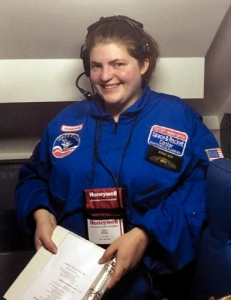Science teacher goes to space camp
By Joey Pitchford
Published in News on September 2, 2016 1:46 PM

Submitted photo
Heidi Barber is seen in her flight suit in June during a trip to space camp. The trip, sponsored by Honeywell Inc., was designed to give educators resources and training on teaching about space.
Space camp. It's a science-minded kid's dream, a near-mythological place of adventure in the far-off land of Huntsville, Ala.
So, when Grantham Middle School science teacher Heidi Barber had the chance to go to camp in the first week of June, she took it without hesitation.
Ms. Barber first learned about the program through Grantham Middle and decided on a whim to apply. She didn't expect to be accepted, but she liked the look of the camp for its hands-on nature.
"Right away, I knew it was exactly what would fit my teaching style," Ms. Barber said.
The opportunity came from Honeywell International, an avionics product manufacturer that sponsors an annual trip to space camp for educators around the world. Split into two week-long sessions, the camp is made up of "45 hours of classroom, laboratory and field-training," according to the Honeywell website.
For Barber, one thing that jumped out at her was the diversity of her group.
"They split us up into teams, and of the 13 people in my team, there were people from six different countries," she said. "And that's just my team, they had over 200 educators there."
The educators went through simulated astronaut training, as well as other simulations designed to imitate real-life space scenarios. These ranged from a multi-axis trainer, a machine which spins the occupant around in three dimensions without ever spinning them the same way twice, to a chair which simulated the one-fourth Earth gravity found on the moon.
The group also ziplined backward into a lake to simulate a space shuttle reentry, as well as participated in a mock helicopter crash.
The main project, however, was a simulated lunar mission which saw each group member assigned a different role in getting astronauts to the moon. Ms. Barber played the part of an ISS (International Space Station) scientist, and spent hours learning her job over the course of the week.
Ms. Barber said that working together so closely with her team was one of the best parts of the camp.
"The international connections, the professional growth and to be able to work globally were all very valuable," she said.
After the camp, the educators were given access to a wide variety of instructional resources to bring back to their classes, including space-based lesson plans and project ideas. Ms. Barber plans to implement some of them in her class this year, including a NASA-based project known as "Tomatosphere" in which students will plant tomato seeds previously kept in the ISS to research the effects of space travel on their growth. They will send the data they gather back to NASA, where it will be compiled with data from many other schools to form a fuller picture.
Ms. Barber said that working together in such a way will be vital to further progress in space.
"The first human's to step foot on Mars will be from this generation, and it will take a global effort," she said. "I have to teach how to be a 21st-century leader and a 21st-century learner."
Applications for the next Honeywell Educators Space Academy are currently being accepted until Nov. 11. The trip is completely financed by Honeywell-travel, meals, space camp tuition and accommodations are all provided for free. Applicants must be certified teachers currently teaching science or math to students age 10-14, and will continue to do so through 2017. To apply, visit educators.honeywell.com/application.
